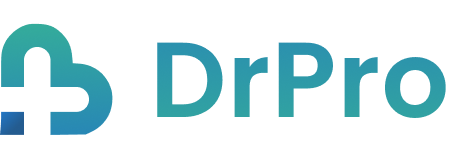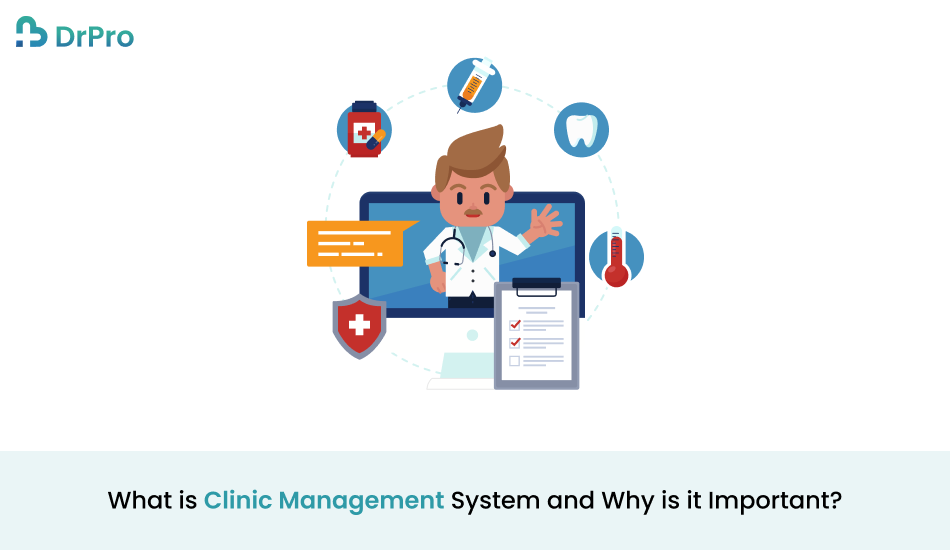Informing the text It is extremely important to organize the clinic’s work effectively because it is in this sector that the main focus is healthcare. Regardless of their size, clinics are expected to offer the services of patient care, appointment Scheduling, records keeping, and legal adherence among other tasks. Conventional means of addressing these functions are usually slowed down and inaccurate and often characterized by inefficiencies. This is the area where the Clinic Management System (CMS) is useful—a type of Healthcare Software Solutions that is designed to help clinics run efficiently.
Yet in this article, you will learn what Clinic Management System is, why it is crucial for clinics’ functions, their key characteristics and advantages, and ways that Clinic Management Software from DrPro can enhance the clinic’s performance.
What is a Clinic Management System?
A Clinic Management System (CMS) can be described as an IT application for managing the different tasks, administrative and clinical, within a clinic. Some of the processes include patient appointment scheduling, patient record handling, invoicing, and stock control among others, as well as patient information processing. The objective is to enhance the competency level of the clinic, in an overall manner, and at the same time to upgrade the quality of service delivery for patients.
Fundamentally, a CMS is a holistic hub that unifies elements of clinic management into one gateway through which medical practitioners can view patient data, treatments, appointments, and billing transactions all in a live feed. Paperwork is minimized as well human errors are eliminated and it is possible to ensure it all flows properly from simple patient visits to even administrative work.
Healthcare software solutions such as Clinic Management Systems are applications that seek to revolutionize the Healthcare Software Solutions facilities in an organization by providing working solutions that enhance productivity, patient care, and efficient administration of tasks in the implementing organization.
Why Should Clinics Adopt This Software?
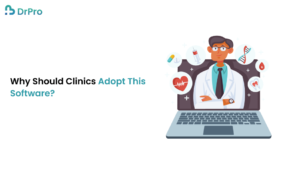
A clinic is not easy to manage. Clinic staff juggle between coping with many patients to make sure that billing is proper and inventory is replenished among many others. If there is no great structure that helps in organizing these activities, the chances are that they will become very complicated to handle hence there will be time wastage, a break in communication or even poor quality work might be produced. This is where a Clinic Management System can make a big difference.
Efficiency:
One of the biggest advantages of implementing a CMS is that it helps to boost efficiency. Appointments, patient records, and billing can be automated and this will help free up lots of time. This prevents staff from concentrating on the documentation of the patient record rather than attending to the patient.
Accuracy:
Another advantage of a CMS is to reduce the human factor and errors, as many of them can be assigned to an automatic procedure. The inclusion of auto-billing, correct patient records and updates on time management features can greatly help clinics eliminate costly mistakes and increase the percentage of correct patient care.
Cost Savings:
By saving working hours and decreasing the number of mistakes clinics can save their money. This I believe translates into efficient ways of resource use an area that assists clinics to cut on the expenses incurred in the future.
Improved Patient Experience:
A clinic that implements a CMS can offer the following to the patients; The capability of patients includes; booking appointments, accessing their records, and appointment notifications for next visits among others. This in turn results in improvement of patients’ satisfaction and hence increased patient loyalty.
Data Security and Compliance:
Hospitals and other Healthcare Software Solutions organizations work with personal health information that has to be protected and processed. One of the benefits of a CMS is that it is easy to access user’s data, particularly in health facilities where privacy acts such as HIPAA apply. It also assists in creating an audit trail reporting system to aid clinics in getting compliance with audits.
Real-Time Access to Data:
A CMS enables Healthcare Software Solutions providers to view patient info at a glance meaning that decisions can swiftly be made. This may be particularly vital when a patient has an emergency because physicians can instantly access the patient’s record and current health management strategies.
Key Clinic Management System Features and Benefits
Now that we have established the advantages of implementing a CMS let us consider the features and values of such healthcare software solutions as Clinic Management Systems to look in 2024.
1. Appointment Scheduling and Management
Perhaps the most critical operational area of any clinic is appointment scheduling. A CMS can schedule automatically to minimize cases where two or more people book the same time slot or when an appointment is missed. Patients can be able to fix appointments online and staff can also plan their work calendar easily. This also saves time and it also makes much sense in the way that the clinic’s resources are utilised.
Benefit: Less paperwork, fewer appointments mismanagement, and higher patient satisfaction.
2. Patient Record Management
An example of the function or capability that a CMS enables a clinic is to suspend electronic health records (EHR) securely. Thus, one can receive prompt access to all patient information – medical history, individual treatment regimen, results of some tests, and prescriptions. This does away with paperwork and means that any Healthcare Software Solutions provider attending to the patient has access to the most recent information about the patient.
Benefits : Less errors, easier access, speed and efficiency to processes, and simplified workflow.
3. Billing and Payments
It is not always easy to handle the billing process in a clinic where many options on payment and insurance claims are involved together with service charges varying depending on the type of service to be rendered. CMS is designed to facilitate billing requirements; monitor payment transactions; and produce invoices. This minimizes errors and also guarantees billings are correct.
Benefits: Better patient billing, decrease in paperwork, and more efficient cash flow management.
4. Inventory and Stock Management
Medical facilities may be required to handle products like medical equipment, medical supplies, and even drugs. Some applications of CMS include tracking of stock where the system notifies the personnel when certain products are about to run out or when restocking is due. This way the clinic is fully stocked with the required items and one is almost certain that critical items are not going to run out.
Benefit: Faster real-time stock identification and management; minimized wastage, and optimal utilization of resources.
5. Patient Communication and Engagement
With a CMS, clinics can stay in touch with patients, for instance, through calls for appointments, and messages of follow-ups and reminders. Patients can also renew prescriptions, follow the progress of results of their tests, and even converse with their caregivers through this system.
Benefit: The potential outputs include increased patient involvement, improved interpersonal and intra-organizational communication, and an increased degree of patient satisfaction.
6. Reporting and Analytics
A good CMS offers necessary and sufficient reports analytics to clinic managers so that they can track their KPIs such as several patients treated, total revenue generated, and staff efficiency among others. This information is useful for clinic managers to make rational decisions in solving operational issues.
Benefit: More efficient decisions, better management of operations and operations, the superior financial performance.
How Clinic Management Systems Can Improve Clinic Performance
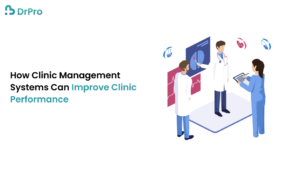
Clinics that implement a CMS reap many benefits in clinic operations and efficiency. Here’s how:
Streamlined Operations:
A CMS reduces the intervention of individuals in the process and therefore reduces the time that Healthcare Software Solutions providers can expend on patient care. To be more specific, the clinic will be better off by fully automating scheduling, billing, and record management so that its staff can see more patients without expending much effort.
Better Resource Management:
Through a CMS, clinics can track the use of their resources which include human resources, equipment, or medication. When it comes to the aspect of real-time data and the automation of tools, clinics can see that all the work done corresponds to optimality in terms of resource use.
Improved Patient Outcomes:
Decision-making in the provision of health care services would be enhanced since the patient data is easily accessible. It results in enhanced patient phenotypes since the treatments are differential and care is well organized.
Increased Revenue:
Besides cutting down the administrative burdens, and increasing operational efficiency, CMS means clinics can accommodate more patients, and this means more billing, fewer mistakes, and more money. Also, automated billing and payments reduce the time when payment is made hence increasing cash flow.
Regulatory Compliance:
These corporations have described various healthcare Software Solutions regulations they have to meet for instance Health Insurance Portability and Accountability Act (; HIPAA)in the United States. A CMS assists in compliance by providing safe storage and retrieval of patients’ information, as well as creating reports of relevant activity, and knowledge of certificates and permits that must be obtained.
Using DrPro’s Clinic Management Software for Your Benefits
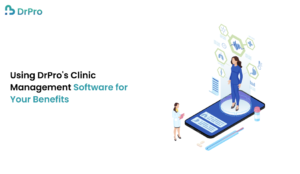
Clinic Management Software is one of the most innovative Healthcare Software Solutions offered by DrPro’s clinic to help clinics run effectively. Thus, the main functions of the software, including the patient record system, scheduling and appointment options, billing solution, and inventory tracking system available with DrPro ensure clinic optimization.
Clinic processes include patient data, appointment scheduling, diagnosis, prescriptions, lab testing, receiving payments, and billing which are all handled in a single software system by DrPro. Clinics that use DrPro’s software can expand patient satisfaction, narrow down their administrative load, and grow their revenue faster thanks to effective UI, safe data bolsters, and data analysis in real time.
Conclusion
Therefore, to sum up, the applied Clinic Management System (CMS) is not a luxury good, but rather, a necessity in the development of modern clinics. These clinic healthcare software solutions assist in the management of clinic activities, patients’ care, and legal requirements. Another advantage of a CMS is that it has numerous functions that enhance a clinic’s functionality as well as decrease expenses.
All these and much more are provided by Clinic Management Software from DrPro’s Clinic Management Software for clinics of all sizes. Therefore, your clinic will run effectively, deliver improved patient satisfaction, and be more profitable if it has the right CMS system.
FAQs
Q1. How do Healthcare Software Solutions improve patient experience?
It simplifies appointment booking, sends reminders, and allows easy access to medical records and communication with providers.
Q2. Is a Clinic Management System secure?
Yes, it uses encryption and complies with regulations like HIPAA to protect patient data.
Q3. Can a CMS integrate with other systems?
Yes, it can integrate with systems like EHRs and lab management software for seamless data exchange.
Q4. How does a CMS help with compliance?
It ensures secure data storage, generates audit reports, and keeps records compliant with Healthcare Software Solutions regulations.
Q5. Is DrPro’s CMS suitable for small clinics?
Yes, DrPro’s software is scalable and works well for both small and large clinics.

